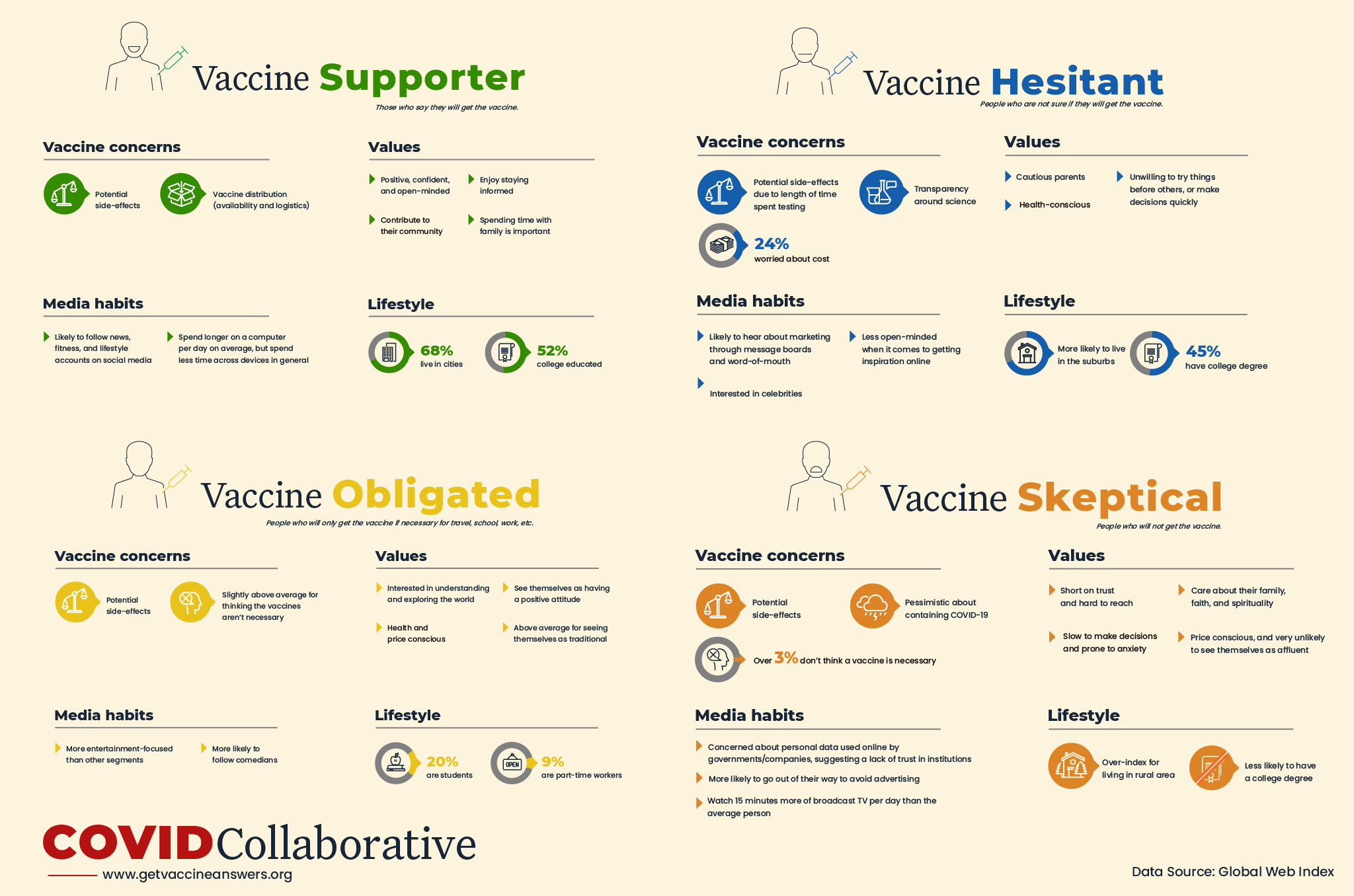Data scientists have grouped vaccine behaviors into archetypes that help visualize how the attitudes differ among social groups.
To vaccinate or not to vaccinate. That is the question.
Some experts believe that between 70% to 80% of a population must be vaccinated to achieve herd immunity. But attitudes towards these vaccines are undoubtedly mixed. Estimates show that one-third of people globally have some significant concerns.
Using survey data from eight countries, Global Web Index created the following five archetypes to help illustrate how typical attitudes towards vaccines differ depending on age, income, lifestyle, and values.
Vaccine Supporters

“Vaccine Supporters” include people who say they will get the vaccine.
Out of all participants surveyed, 66% of them support the idea of getting a vaccine. However, this group skews towards younger people (18-34) who are likely working professionals earning a high income and living in a city.
Despite their optimism toward vaccines, one-third of vaccine supporters say they will wait to get one due to lingering concerns about vaccine distribution and potential side effects.
Interestingly, this procrastination mindset was seen before during the H1N1 (swine flu) pandemic when both members of the public and healthcare workers had low acceptance levels due to safety concerns.
Vaccine Hesitant

“Vaccine Hesitant” are not sure if they will get the vaccine.
More common among cautious suburban parents, the vaccine-hesitant group makes up 12% of the total study. They are more likely to be female and feel anxious about the length of time spent testing vaccines and therefore require more transparency around the science.
Related story: New year, new hope for rural America in the fight against COVID
This group could likely be more easily swayed, as they are more receptive to word-of-mouth and messaging boards to get advice from their peers over any other medium.
Vaccine Obligated

“Vaccine Obligated” will only get the vaccine if necessary for travel, school, work, etc.
The vaccine obligated group makes up 11% of the total and skews towards males aged between 16 and 24 years old.
While this group is also concerned with potential side effects, their responses suggesting that a vaccine may not be necessary to combat were above average compared to other segments in the study. They also index above average when it comes to viewing themselves as traditionalists.
Vaccine Skeptical

“Vaccine Skeptical” won’t get the vaccine.
The vaccine skeptical group makes up another 11% of the total. However, this group is primarily female, aged between 45-and 64 and earning a lower-than-average income. They are less likely to have a college degree and are more likely to live in rural areas.
Related story: Office space impacted by COVID 19 predicted to bounce back
Along with the worry of potential side effects, this group is generally more pessimistic. Therefore, a small percentage do not believe a vaccine will help tackle the global health crisis.
With notably low trust levels, this group is one of the hardest to reach and potentially persuade. However, what makes them unique is their lack of faith in the scientific process.
Anti-Vaxxers

Anti-vaxxers will not get the vaccine because they are against vaccines.
It is important to note that those who choose not to get a vaccine should not be confused with anti-vaxxers.
Anti-vaxxers are a sub-segment of the vaccine skeptical group, making up 1.4% of the total population. The difference is anti-vaxxers do not believe in getting any vaccine due to safety concerns.
According to the study, anti-vaxxers tend to fall into one of two age brackets, between 16-24 years or 55-64 years old, and are typically males with lower incomes.
Another Tool in the Arsenal
The study demonstrates that broad segments of society—regardless of their demographic or views—are at least somewhat concerned about vaccines becoming widely available.
While scientists are not sure if the current vaccines on the market can stop infection or transmission of the virus, they are an essential part of our global defenses against other safety restrictions like wearing masks and keeping a distance.




























